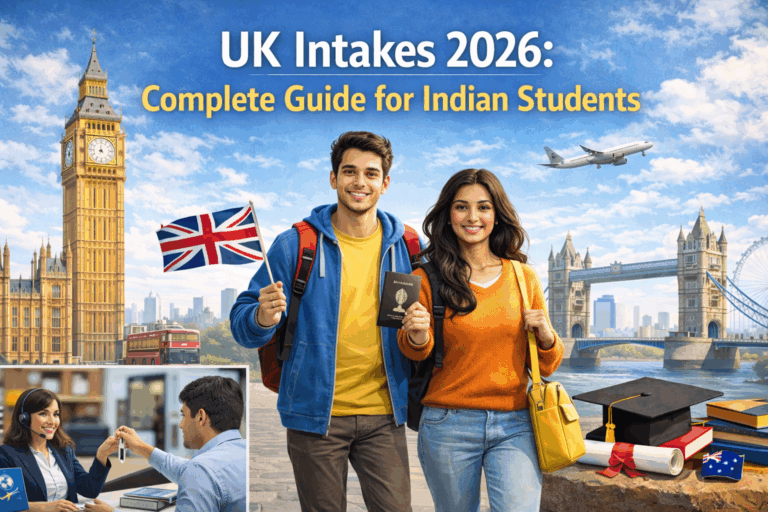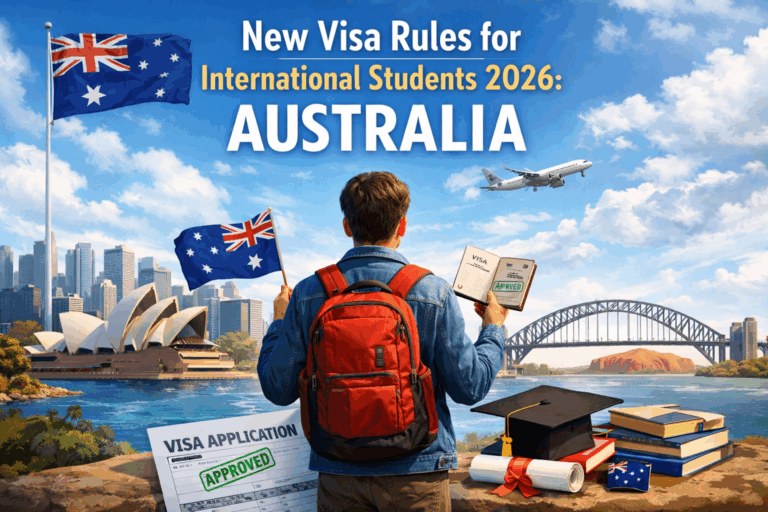Call Us:+91-9920234749, +91-9833420909 info@studyandworkabroad.in

Post-Study Work Visa Updates 2025–26: UK, Canada, Australia, Germany & New Zealand Compared
For Indian students planning to study abroad in 2025–26, the post-study work visa (PSW) is one of the most important factors when selecting a destination. It determines how long you can stay back, work, gain international exposure, and in many cases, transition towards permanent residency (PR).
This blog compares the latest PSW rules across the UK, Canada, Australia, Germany, and New Zealand, highlighting key updates for 2025–26.
What Is a Post-Study Work Visa?
A post-study work visa (or its equivalent) allows international graduates to remain in the host country after completing their studies to gain work experience.
Eligibility and duration depend on:
- The type of degree completed
- The study location and course duration
- Institutional recognition
- Immigration policy changes in 2025–26
United Kingdom (UK)
Graduate Route Updates 2025–26
The UK remains a top choice for Indian students, but 2025 brought important changes.
- Currently, the Graduate Route visa allows Bachelor’s and Master’s degree holders to stay back for 2 years, while PhD graduates can stay for 3 years.
- The new policy aims to encourage quicker transition into the Skilled Worker visa.
- Dependents already in the UK under a Student visa may remain, but adding new dependents under the Graduate Route will not be allowed.
Pathway to PR:
After completing the Graduate visa, students must switch to a Skilled Worker visa once they secure a qualifying job. After 5 years of continuous stay under this visa, they can apply for Indefinite Leave to Remain (ILR).
Takeaway for Indian students:
Shorter PSW duration means you need to plan internships and job applications early during your course.
Canada
Canada is consistently among the most PR-friendly destinations for Indian students.
Post-Graduation Work Permit (PGWP) 2025–26
- Graduates of eligible programs can get up to 3 years of PSW depending on their program length.
- Shorter diplomas and certificate programs may not always qualify.
- In 2025, Canada revised its proof of funds requirement to CAD 22,895 per year (outside Québec) for study permit applicants.
- Some course fields temporarily lost PGWP eligibility in 2025 but were reinstated for early 2026.
Pathway to PR:
Work experience gained under PGWP is valuable for Express Entry and Provincial Nominee Programs (PNPs). Canada remains one of the most accessible pathways for PR after studies.
Takeaway:
Choose programs carefully to ensure PGWP eligibility, and be financially prepared for higher proof-of-funds requirements.
Australia
Australia’s Temporary Graduate Visa (Subclass 485) continues to attract Indian students due to strong post-study work options.
Current Rules 2025–26
- Bachelor’s and Master’s graduates: 2 to 4 years depending on program and study location.
- PhD graduates: up to 4 years.
- Courses must be CRICOS-registered.
Recent Highlights:
- The government is maintaining a high intake for skilled migration, with special incentives for regional study.
- Students in regional areas often receive longer PSW durations and additional PR points.
Pathway to PR:
Graduates can apply through the General Skilled Migration program if they meet the points criteria (age, English, work experience, etc.).
Takeaway:
Regional study can give Indian students both extended PSW and stronger PR prospects.
Germany
Germany is unique for offering low-cost or tuition-free education in many public universities.
Job-Seeker Visa for Graduates
- After completing a degree, graduates can stay back for 18 months to search for jobs related to their field of study.
- Once employed, they can switch to a work permit or EU Blue Card.
Pathway to PR:
Graduates who secure employment and fulfill residency conditions can apply for permanent settlement after 2–3 years on a work visa or Blue Card.
Takeaway:
German language skills greatly improve employability and integration opportunities.
New Zealand
New Zealand has re-emerged as a popular destination thanks to student-friendly policies.
Post-Study Work Visa (PSWV) 2025–26
- Students completing a Level 7 Bachelor’s degree or higher, studied full-time for at least 30 weeks in New Zealand, are eligible for up to 3 years of PSW.
- For lower-level qualifications, eligibility depends on whether the program is on the approved list and linked to a skill shortage.
- From November 2025, student visa holders can work 25 hours per week during term (increased from 20).
- Master’s students who pursue a Postgraduate Diploma followed by a Master’s remain eligible for PSW.
Pathway to PR:
Experience gained under PSW supports applications under New Zealand’s skilled residence pathways, which continue to be updated to attract international talent.
Takeaway:
With extended work hours during study and a strong PSW pathway, New Zealand is positioning itself as a balanced option for Indian students.
Comparative Summary
| Country | PSW Duration (2025–26) | Key Highlights | PR Pathway |
| UK | 24 months for Bachelor’s/Master’s, 3 years for PhD | New policy aims to encourage quicker transition into the Skilled Worker visa. | Skilled Worker visa → ILR |
| Canada | Up to 3 years | Higher proof of funds, PGWP reinstatements | Express Entry, PNPs |
| Australia | 2–4 years | Regional incentives, CRICOS requirement | Skilled Migration points system |
| Germany | 18 months job-seeker visa | can apply for permanent settlement after 2–3 years on a work visa or Blue Card | Work permit → PR |
| New Zealand | Up to 3 years | Increased work hours, broad eligibility | Skilled residence pathways |
FAQs: Post-Study Work Visas in 2025–26
Q1. Is the UK Graduate Route changing?
There is a white paper proposal to reduce the Graduate Route stay-back period for most students to 18 month.
Q2. Which country offers the longest PSW duration?
Canada and New Zealand both allow up to 3 years, while Australia may grant up to 4 years depending on degree and location.
Q3. Is Germany’s PSW pathway good for Indian students?
Yes, it offers 18 months of job search time and low upfront costs due to free education and visa fee waivers.
Q4. Can New Zealand students work while studying?
Yes, from November 2025, international students can work 25 hours per week during term.
Q5. Which country is best for PR after studies?
Canada remains the most PR-friendly due to Express Entry and PNP programs, but Australia, UK, Germany and New Zealand also offer structured migration routes.
Conclusion
For Indian students, choosing a study destination in 2025–26 should go beyond university rankings and tuition fees. The post-study work visa and PR pathway are equally important.
- The UK is shortening its Graduate Route, so students must plan job applications early.
- Canada remains strong with its PGWP and PR pathways.
- Australia favors regional graduates with longer stays and PR points.
- Germany offers affordability plus job-seeker flexibility.
- New Zealand is boosting work rights and stay-back opportunities.
By aligning your study choice with your career and migration goals, you can make the most of your overseas education investment.



